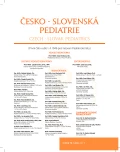-
Medical journals
- Career
General Movements – examination of immature nervous system
Authors: A. Nogolová
Authors‘ workplace: Oddělení dětského lékařství, Městská nemocnice Ostrava, p. o.
Published in: Čes-slov Pediat 2017; 72 (1): 51-53.
Category: Review
Overview
Long term prognosis and the quality of life of every pre-term and high-risk infant are influenced mostly by neurological diseases such as cerebral palsy, mental retardation or epilepsy. The effort of the neurologist is to diagnose the abnormal development early, define the adequate intervention and assess the prognosis of child´s development. The aim is to minimize the development of the fuction alteration. The problem is that the examinations are not standardized, various methods are incomparable and their utilization is different.
One of the possibilities, how to examine the immature nervous system is the method described by professor Prechtl, so called General Movements. The knowledge of this method gives us the possibility of early prediction of the neurological abnormality. The theoretical precondition is that the spontaneous motoric activity is the best indicator of the functional integrity of the brain. The General Movements method is only one step of the examination, there must also be involved the anamnesis, clinical neurological examination, assessment of the imaging of the brain etc.KEY WORDS:
General Movements, video recording, full term, pre-term, cerebral palsy
Sources
1. Einspieler C, Peharze R, Marschik PB. Fidgety movements - tiny in appearance, but huge in impact. J Pediatr (Rio J) 2016; 92 (3 ): 64–70.
2. Olsen JE, Brown NC, Eeles AL, et al. Early general movements and brain magnetic resonance imaging at term-equivalent age in infants born <30 weeks‘ gestation. Early Hum Dev 2016; 101 : 63–68.
3. Morgan C, Crowle C, Goyen TA, et al. Sensitivity and specificity of general movements assessment for diagnostic accuracy of detecting cerebral palsy early in an Australian kontext. J Paediatr Child Health 2016; 52 (1): 54–59.
4. Einspieler C, Marschik PB. It is not too early: Clinical implications of early spontaneous movements. In: Abstracts of the 42nd Annual Meeting of the Society for Neuropediatrics. Bochum/Germany: 2016.
5. Crowle C, Badawi N, Walker K, Novak I. General movements assessment of infants in the neonatal intensive care unit following surgery. J Paediatr Child Health 2015; 51 (10): 1007–1011
6. Marková D, Weberová-Chvílová M, Klement P, a kol. Péče o děti s perinatální zátěží v Centru komplexní péče KDDL. Neonatologické listy 2013; 19 (2): 8–15. ISSN 1211-1600.
7. Beccaria E, Martino M, Briatore E, et al. Poor repertoire general movements predict some aspects of development outcome at 2 years in very preterm infants. Early Hum Dev 2012 Jun; 88 (6): 393–396.
8. Menkes JH, Sarnat HB, Maria BL. Dětská neurologie 1. díl. 7. vyd. Praha: Triton, 2011 : 575–591.
9. Einspieler C, Prechtl HF. Prechtl‘s assessment of general movements: a diagnostic tool for the functional assessment of the young nervous system. Ment Retard Dev Disabil Res Rev 2005; 11 (1): 61–67.
10. Ferrari F, Cioni G, Einspieler Ch, et al. Cramped synchronized general movements in preterm infants as an early marker for cerebral palsy. Arch Pediatr Adolesc Med 2002; 156 (5): 460–467.
11. Cioni G, Ferrari F, Einspieler Ch, et al. Comparison between observation of spontaneous movements and neurologic examination in preterm infants. J Pediatr 1997; 130 (5): 704–711.
12. Cioni G, Prechtl HFR, Ferrari F, et al. Which better predicts later outcome in fullterm infants: quality of general movements or neurological examination? Early Hum Dev 1997; 50 : 71–85.
13. Einspieler Ch, Prechtl HF, Ferrari F, et al. The qualitative assessment of general movements in preterm, term and young infants-review of the methodology. Early Hum Dev 1997 Nov 24; 50 (1): 47–60.
14. http://www.uzis.cz/publikace/narozeni-zemreli-do-1-roku-2012.
15. http://www.uzis.cz/katalog/zdravotnicka-statistika/rodicka-novorozenec.
Labels
Neonatology Paediatrics General practitioner for children and adolescents
Article was published inCzech-Slovak Pediatrics

2017 Issue 1-
All articles in this issue
- Approach to children with first, uncomplicated upper urinary tract infection
- Recurrent urinary tract infection – benefit of the diagnosis and treatment of voiding dysfunction
- Early antibiotic therapy and risk of renal scarring in children with a first uncomplicated urinary tract infection
- Haemophilus diseases in ENT in children before and after the introduction of Haemophilus influenzae type b vaccine
- Unusual case of hypercalcemia in a patient with primary steroid-resistant nephrotic syndrome
- Quality of sleep in children and adolescents with type 1 diabetes
- Thyroid function in obese children
- Repeated gastrointestinal bleeding
- General Movements – examination of immature nervous system
- Acquired cardiovascular disease in Turner syndrome
- Guideline for the Neurodiagnostic Evaluation of the Child With a Simple Febrile Seizure. Adapted Clinical Practice Guideline of the American Academy of Pediatrics
- Czech-Slovak Pediatrics
- Journal archive
- Current issue
- Online only
- About the journal
Most read in this issue- Haemophilus diseases in ENT in children before and after the introduction of Haemophilus influenzae type b vaccine
- Repeated gastrointestinal bleeding
- General Movements – examination of immature nervous system
- Guideline for the Neurodiagnostic Evaluation of the Child With a Simple Febrile Seizure. Adapted Clinical Practice Guideline of the American Academy of Pediatrics
Login#ADS_BOTTOM_SCRIPTS#Forgotten passwordEnter the email address that you registered with. We will send you instructions on how to set a new password.
- Career

